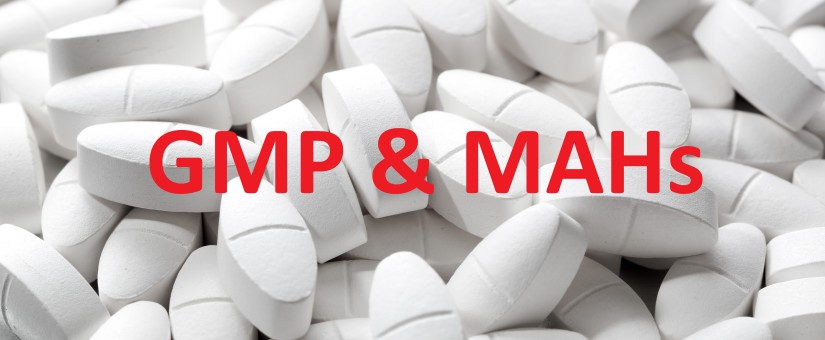
GMP and MAHs
- 13 October 2016
- 2019/6, EU, GMP, MAH, marketing authorisation holder, regulation,
Update [18/11/2021]
On 29 July 2021, the European Medicines Agency (EMA) published final version of Reflection paper on Good Manufacturing Practice and Marketing Authorisation Holders. This Reflection Paper is focussed on the GMP-related responsibilities that apply to Marketing Authorisation Holder (MAH) companies and it seeks to provide clarity as to what the various responsibilities are and what they mean for MAHs at a practical level. However, this Reflection Paper does not provide guidance on ‘how’ the various responsibilities might be fulfilled.
Comparing to the draft Reflection paper, the final version of document describes in more detail responsibilities that apply to Marketing Authorisation Holders (MAHs) of veterinary medicinal products according to Regulation (EU) 2019/6.

On 4 October 2016, the European Medicines Agency (EMA) released for 3 months public consultation a new document entitled Concept paper on Good Manufacturing Practice and Marketing Authorisation Holders.

The current EU Guide to GMP refers in several places to Marketing Authorisation Holder (MAH) companies and their responsibilities in relation to GMP ensuring that the manufacturing authorisation holder can comply with GMP. These responsibilities for MAHs are spread over various chapters and annexes of the Guide, and are quite numerous.
It is considered that there is a lack of clarity and awareness among MAHs as to the various responsibilities that relate to them, as stated in the current EC Guide to GMP and in related legislation, enabling compliance of the manufacturing authorisation holder with GMP.
The following are just some of the responsibilities that relate to MAHs as stated in the current EC Guide to GMP:
- Chapter 1 of the Guide, in Section 1.11 on PQRs, places a clear responsibility on MAHs, in cases where they are not the manufacturer, to evaluate the results of the PQR review and to make an assessment as to whether corrective and preventive action or any revalidation should be undertaken. In many cases, experience has shown that MAHs are often not performing such PQR evaluations.
- Annex 2, in paragraph 36., indicates that MAHs have tasks in relation to human tissues and cells that are used as starting materials for biological medicinal products. It states that a technical agreement should be in place between the responsible parties (e.g. manufacturers, tissue establishments, sponsors, MA Holder) which defines the tasks of each party, including the Responsible Person and Qualified Person.
- In Annex 19, there are MAH responsibilities set out in paragraphs 6.1 and 10.2 for ensuring that reference and retention samples are taken, and stored.


Perhaps the strongest reference in the EC Guide to GMP in relation to the responsibilities of MAHs is in Annex 16. This states that ‘the ultimate responsibility for the performance of a medicinal product over its lifetime, its safety, quality and efficacy, lies with the marketing authorisation holder (MAH).
In relation to legislation, there are also specific obligations imposed on MAHs that relate to GMP and product quality considerations generally. For example:
- Article 23 of Directive 2001/83/EC and Article 27 Directive 2001/82/EC requires marketing authorisation holders to maintain Marketing Authorisations (MAs) in line with scientific advances, and this has direct relevance for manufacturing sites. The article states that, after an authorisation has been issued, the authorisation holder must, in respect of the methods of manufacture and control provided for in the MA application, take account of scientific and technical progress and introduce any changes that may be required to enable the medicinal product to be manufactured and checked by means of generally accepted scientific methods.
There are also provisions in the legislation related to product supply obligations of MAHs.
- Article 81 of Directive 2001/83/EC concerns the supply of medicinal products, and it requires MAHs to, within the limits of their responsibilities, ensure continued and appropriate supplies so that the needs of patients are covered. (In relation to this, Chapter 5 of the EC Guide to GMP, paragraph 5.71, requires manufacturers to report to the MAHs in a timely manner any constraints in manufacturing operations which may result in abnormal restriction in the supply, to facilitate reporting of the restriction in supply by the MAH to the relevant competent authorities).

It should be underlined here that certain important activities of MAHs with respect to ensuring GMP and MA compliance are not well addressed in the current EC Guide to GMP. For example, providing the various manufacturing sites with the necessary information contained within CTD Modules 1 and 3 from the MA in order to enable the sites to manufacture medicines in compliance with the MA.
Furthermore, the management of MA variations and regulatory commitments (made between a MAH and a competent authority), and the communication of those to the various manufacturing sites, can have a significant impact on MA compliance if not done correctly. The importance of robust communication processes in this area will likely assume increased importance as we move towards greater flexibility in post-approval lifecycle change management (e.g. more “do and tell” variations).
We have already informed on our website about a Final Concept Paper for a new ICH Q12 Guideline entitled Technical and Regulatory Considerations for Pharmaceutical Product Lifecycle Management published by ICH in September 2014. ICH Q12 guideline will provide a framework to facilitate the management of post-approval Chemistry, Manufacturing and Controls (CMC) changes in a more predictable and efficient manner across the product lifecycle.
Taking all of this into account, it is recommended to develop a reflection paper intended to capture all of the responsibilities that apply to MAH companies to enable manufacturers to comply with GMP. It would also result in a more complete picture of the regulatory environment with respect to GMP in which the MAH operates.
Source: EMA, EC



